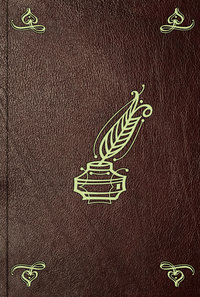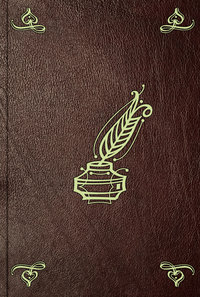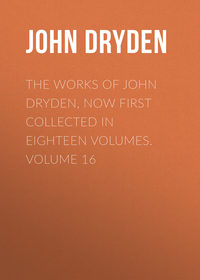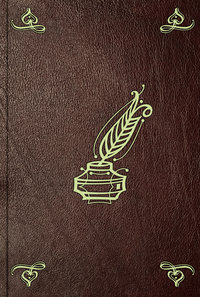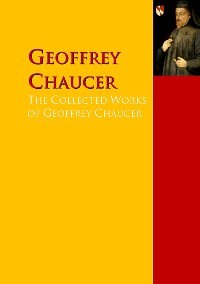The Works of John Dryden, now first collected in eighteen volumes. Volume 12
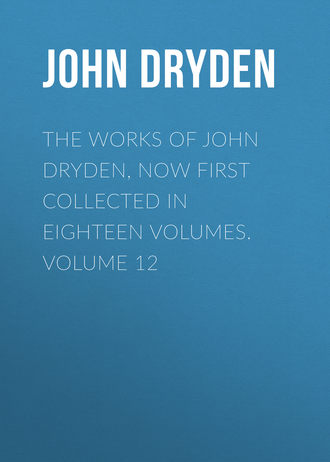 полная версия
полная версияThe Works of John Dryden, now first collected in eighteen volumes. Volume 12
Настройки чтения
Размер шрифта
Высота строк
Поля
When that Phœbus his chair of gold so hieHad whirlid up the sterrie sky aloft,And in the Bole was entrid certainly,When shouris sote of rain descendid soft,Causing the ground felè timis and oftUp for to give many an wholesome air,And every plain was yclothid faire:With newè grene, and makith smalè floursTo springin here and there in field and mede,So very gode and wholesome be the shours,That they renewn that was old and dedeIn winter time, and out of every sedeSpringith the herbè, so that every wightOf this seson wexith richt glade and licht.And I so gladè of the seson swete,Was happid thus; upon a certain nightAs I lay in my bed slepe full unmeteWas unto me, but why that I ne mightRest I ne wist, for there n'as erthly wight[As I suppose] had more of hertis eseThan I, for I n'ad sicknesse nor disese:Wherefore I mervaile gretly of my selfThat I so long withoutin slepè lay,And up I rose thre houris aftir twelfe,About the springing of the gladsome day,And on I put my gear and mine aray,And to a plesaunt grove I gan to pasLong or the bright sonne uprisin was;In which were okis grete, streight as a line,Undir the which the grass so freshe of heweWas newly sprong, and an eight fote or nineEvery tre well fro his fellow grew,With braunchis brode laden with levis new,That sprongin out agen the sonne shene:Some very rede, and some a glad light grene:Which [as me thought] was a right plesaunt sight;And eke the birdis songis for to hereWould have rejoisid any erthly wight,And I, that couth not yet in no manereHerein the nightingale of all the yere,Full busily herk'nid with hert and ereIf I her voice perceve could any where:And at the last a path of litil bredeI found, that gretly had not usid be,For it forgrowin was with grass and wede,That well unnethis a wight might it se;Thought I, this path some whider doth parde;And so I followid till it me broughtTo a right plesant herbir wel ywrought,Which that benchid was, and with turfis newFreshly turvid, whereof the grene grassSo small, so thick, so short, so fresh of hewe,That most like to grene woll wot I it was;The hegge also, that yedin in compas,And closid in allè the grene herbere,With sycamor was set and eglatere.Within, in fere so well and cunningly,That every braunch and lefe grew by mesurePlain as a bord, of an height by and by,I se nevir a thing [I you ensure]So well ydone, for he that toke the cureIt for to make [I trowe] did all his peineTo mak it pas al tho that men have seine.And shapin was this herber rofe and alAs is a pretty parlour, and alsoThe hegge as thick as is a castil wall,That who that list without to stond or go,Thogh he wold al day prayin to and fro,He should not se if there were any wightWithin or no, but one within well might —Perceve all tho that ydin there withoutInto the field, that was on every sideCoverd with corn and grass, that out of doubtTho one would sekin all the worlde wideSo rich a felde could not be espydeUpon no cost, as of the quantity,For of allè gode thing there was plenty.And I, that al these plesaunt sightis se,Thought suddainly I felt so swete an airOf the eglaterè, that certainlyThere is no hert [I deme] in such dispair,Ne yet with thoughtis froward and contraireSo overlaid, but it should sone have boteIf it had onis felt this savour sote.And as I stode and cast aside mine eyeI was ware of the fairist medler treThat evir yet in all my life I se,As full of blossomis as it might be,Therein a goldfinch leping pretilyFrom bough to bough, and as him list he eteHere and there of buddis and flouris swete.And to the herbir side was adjoyningThis fairist tre of which I have you told,And at the last the bird began to sing[Whan he had etin what he etin would]So passing swetely that by many foldIt was more plesaunt than I couth devise;And whan his song was endid in this wise,The nightingale with so mery a noteAnswerid him, that alle the wode yrongSo sodainly, that as it were a soteI stode astonied, and was with the songThorow ravishid, that till late and longI ne wist in what place I was ne where,Ayen methought she song e'en by mine ere:Wherefore I waited about busilyOn every side if I her might se,And at the last I gan full well espieWhere she sate in a fresh grene laury tre,On the further side evin right by me,That gave so passing a delicious smell,According to the eglantere full well;Whereof I had so inly grete plesure,As methought I surely ravished wasInto Paradise, wherein my desireWas for to be, and no ferthir to pasAs for that day, and on the sotè grassI sat me down, for as for mine ententThe birdis song was more convenient,And more plesaunt to me by many foldThan mete or drink, or any othir thing,Thereto the herbir was so fresh and cold,The wholsome savours eke so comforting,That [as I demid] sith the beginningOf the worldè was nevir seen er thanSo plesaunt a ground of none erthly man.And as I sat the birdis herkening thus,Methought that I herd voicis suddainly,The most swetist and most deliciousThat evir any wight I trow trewlyHerdin in hir life, for the armonyAnd swete accord was in so gode musikeThat the voicis to angels most were like.At the last out of a grove evin by[That was right godely and plesaunt to sight]I se where there came singing lustilyA world of ladies, but to tell arightTher beauty grete lyith not in my might,Ne ther array; nevirthèless I shallTell you a pert, tho' I speke not of all:The surcots white of velvet well fittingThey werin clad, and the semis eche one,As it werin a mannir garnishing,Was set with emeraudis one and oneBy and by, but many a richè stoneWas set on the purfilis out of doutOf collours, sleves, and trainis, round about;As of grete perlis round and orient,And diamondis fine and rubys red,And many othir stone of which I wentThe namis now; and everich on her hedeA rich fret of gold, which withoutin dredeWas full of statèly rich stonys set,And evrey lady had a chapelet,On ther hedis of braunchis fresh and grene,So wele ywrought, and so marvelously,That it was a right noble sight to sene,Some of laurir, and some full plesauntlyHad chapèlets of wodebind, and sadlySome of agnus castus werin also,Chaplets fresh; but there were many of tho,That dauncid and eke song full sobirly,But all they yede in maner of compace;But one there yede in mid the companySole by herself; but all follow'd the paceThat she keept, whose hevinly figured faceSo pleasaunt was, and her wele shape person,That of beauty she past them everichone,And more richly beseen by manyfoldShe was also in every manir thing;Upon her hede full plesaunt to beholdA coron of gold rich for any king,A braunch of agnus castus eke beringIn her hand, and to my sight trewilyShe lady was of all the compagnie;And she began a roundell lustilyThat Sus le foyle de vert moy men callSine & mon joly cœur est endormy,And than the company answerid all,With voicis swete entunid and so small,That methought it the swetest melodyThat evir I herd in my lyf sothly.And thus they all came dauncing and singingInto the middis of the mede echone,Before the herbir where I was sitting,And God wot I thought I was well bigone,For than I might avise them one by oneWho fairist was, who best could dance or sing,Or who most womanly was in all thing.They had not dauncid but a little throwWhen that I herd not fer of sodainlySo grete a noise of thundering trumpis blowAs though it should have departid the skie,And aftir that within a while I sieFrom the same grove where the ladies came outOf men of armis coming such a rout,As all men on erth had ben assemblid,On that place well horsid for the nonis,Stering so fast that all the erth tremblid;But for to speke of richis and stonis,And men and horse, I trow the large wonisOf Pretir John, ne all his tresory,Might not unneth have bought the tenth party.Of their array whoso list to here more,I shall reherse so as I can a lite,Out of the grove that I speke of beforeI se come first, all in their clokis white,A company that wore for ther deliteChapèlets fresh of okis serialBut newly sprong, and trumpets were they all;On every trump hanging a brode bannereOf fine tartarium, full richly bete,Every trumpet his lord'is armis bereAbout ther nekkis, with grete perlis sete,Collaris brode, for cost they wou'd not lete,As it would seem, for ther scochons echoneWere set about with many a precious stone;Ther horsis harneis was all white also;And aftir them next in one companyCamin kingis at armis and no mo,In clokis of white cloth with gold richly,Chaplets of grene on ther heds on hye,The crownis that they on ther scotchons bereWere set with perl, and ruby, and saphere,And eke grete diamondis many one;But all ther horsis harneis and other gereWas in a sute according everichone,As ye have herd the foresaid trumpets were,And by seming they were nothing to lere,And ther guiding they did so manirly;And aftir them came a gret companyOf heraudeis and pursevauntis eke,Arrayid in clothis of white velvet,And hardily they were nothing to sekeHow they on them shouldin the harneis set,And every man had on a chapèlet,Scotchonis and eke horse harneis in dedeThey had in sute of them that 'fore them yede.Next after these appere in armour bright,All save ther hedis, semely knightis nine,And every clasp and nail, as to my sight,Of ther harneis were of red gold so fine,With cloth of gold, and furrid with ermine,Were the tappouris of their stedis strong,Both wide and large, that to the ground did hong;And every boss of bridle and paitrelThat they had on was worth, as I would wene,A thousand pound; and on ther hedis wellDressid were crounis of the laurir grene,The best ymade that evir I had sene;And every knight had aftir him ridingThre henchmen, still upon him awaiting;Of which every (first) on a short trunchonHis lord'is helmet bore so richly dightThat the worst of them was worth the ransoumeOf any king; the second a shield brightBare at his back; the thred barin uprightA mighty spere, full sharp yground and kene,And every child ware of levis greneA fresh chap'let upon his hairis bright;And clokis white of fine velvet they were;Ther stedis trappid and arayid right,Without difference as ther lordis were;And aftir them on many a fresh coursereThere came of armid knightis such a routThat they besprad the large field about;And all they werin, aftir ther degrees,Chappèlets new, or made of laurir grene,Or some of oke, or some of othir trees,Some in ther hondis barin boughis shene,Some of laurir, and some of okis bene,Some of hawthorne, and some of the wodebind,And many mo which I have not in mind.And so they came ther horse freshly stirringWith bloudy sownis of ther trompis loud;There se I many an uncouth disguisingIn the array of thilkè knightis proud;And at the last as evenly as they coudThey toke ther place in middis of the mede,And every knight turnid his horsis hedeTo his felow, and lightly laid a spereInto the rest, and so justis beganOn every part aboutin here and there;Some brake his spere, some threw down horse and man,About the felde astray the stedis ran;And to behold their rule and govirnanceI you ensure it was a grete plesaunce.And so the justis last an hour and moreBut tho that crownid were in laurir greneDid win the prise; their dintis were so soreThat there was none agenst them might sustene,And the justing allè was left off clene;And fro ther horse the nine alight anon,And so did all the remnaunt everichone;And forth they yede togidir twain and twain,That to behold it was a worthy sight,Toward the ladies on the grenè plain,That song and dauncid, as I said now right;The ladies as sone as they godely mightThey brakin off both the song and the danceAnd yede to mete them with full glad semblaunce:And every lady toke full womanlyBy the hond a knight, and so forth they yedeUnto a faire laurir that stode fast by,With levis laid, the boughis of grete brede,And to my dome ther nevir was indedeA man that had sene half so faire a tre,For undirneth it there might well have beAn hundrid persons at ther own plesaunceShadowid fro the hete of Phœbus bright,So that they shouldin have felt no grevanceNeithir for rain, ne haile, that them hurt might;The savour eke rejoice would any wightThat hed be sick or melancholious,It was so very gode and vertuous.And with grete rev'rence they enclinid lowUnto the tre so sote and fair of hew,And aftir that within a litil throwThey all began to sing and daunce of new;Some song of love, some plaining of untrew,Environing the tre that stode upright,And evir yede a lady and a knight.And at the last I cast mine eie aside,And was ware of a lusty companyThat came roming out of the feldè wide,And hond in hond a knight and a lady,The ladies all in surcotes, that richlyPurfilid were with many a rich stone,And every knight of grene ware mantlis on,Embroulid wele, so as the surcots were,And everich had a chapelet on her hed,[Which did right wele upon the shining here]Makid of godely flouris white and red,The knightis eke that they in hondè ledIn sute of them ware chaplets everichone,And before them went minstrels many one;As harpis, pipis, lutis, and sautry,Allè in grene, and on ther hedis bareOf diverse flouris made ful craftily,Al in a sute, godely chaplets they ware,And so dauncing into the mede they fare,In mid the which they found a tuft that wasAl ovirsprad with flouris in compas:Whereto they enclined evèrichoneWith grete revèrence, and that full humbly;And at the last there tho began anonA lady for to sing right womanlyA bargaret in praising the daisie,For (as methought) among her notis sweteShe said Si douce est la Margarete!Then they allè answerid her in fereSo passingly well and so plesauntly,That it was a most blisfull noise to here;But I 'not how it happid, sodainlyAs about none the sonne so ferventlyWaxe hotè that the pretty tendir flouresHad lost the beauty of their fresh collours.For shronke with hete the ladies eke to brent,That they ne wist where they them might bestow,The knightis swelt, for lack of shade nie shent,And aftir that within a litil throwThe wind began so sturdily to blowThat down goth all the flowris everichone,So that in all the mede there laft not one,Save such as succoured were among the levesFro every storme that mightè them assaile,Growing undir the heggis and thick greves;And aftir that there came a storme of haileAnd rain in fere, so that withoutin faileThe ladies ne the knightis n'ade o' thredDry on them, so drooping wet was ther wede.And when the storme was clene passid awayTho in the white, that stode undir the tre,They felt nothing of all the grete affrayThat they in grene without had in ybe;To them they yede for routh and for pite,Them to comfort aftir their grete disese,So fain they were the helplesse for to ese.Than I was ware how one of them in greneHad on a coron rich and well-fitting,Wherefore I demid well she was a quene,And tho in grene on her were awaiting;The ladies then in white that were comingTowardis them, and the knightis in fere,Began to comfort them and make them chere.The quene in white, that was of grete beauty,Toke by the honde the quene that was in grene,And seidè, Sustir, I have grete pityOf your annoy and of your troublous teneWherein ye and your company have beneSo long, alas! and if that if you pleseTo go with me I shall do you the eseIn al the plesure that I can or may;Whereof that othir, humbly as she might,Thankid her, for in right evil arrayShe was with storme and hete I you behight;And evèry lady then anon rightThat were in white one of them toke in greneBy the hond, which when the knightis had seneIn like manir eche of them toke a knightClad in the grene, and forth with them they fareTo an heggè, where that they anon rightTo makin these justis they would not spareBoughis to hew down, and eke trees to square,Wherewith they made them stately firis greteTo dry ther clothis, that were wringing wete:And aftir that of herbis that there grewThey made for blistirs of the sonne brenningOintmentis very gode, wholsome and new,Where that they yede the sick fast anointing;And after that they yede about gadringPlesant saladis, which they made them eteFor to refreshe ther grete unkindly hete.The lady of the Lefè then gan to prayHer of the Floare [for so to my semingThey should be callid as by ther array]To soupe with her, and eke for any thingThat she should with her all her pepill bringe,And she ayen in right godely manereThankith her fast of her most frendly chere,Saying plainèly that she would obayWith all her hert all her commandèment;And then anon without lengir delayThe lady of the Lefe hath one ysentTo bring a palfray aftir her intent,Arrayid wele in fair harneis of gold,For nothing lackid that to him long shold.And aftir that to all her companyShe made to purvey horse and every thingThat they nedid, and then full hastilyEven by the herbir where I was sittingThey passid all, so merrily singingThat it would have comfortid any wight:But then I se a passing wondir sight,For then the nightingale, that all the dayHad in the laurir sete, and did her mightThe whole service to sing longing to May,All sodainly began to take her flight,And to the lady of the Lefe forthrightShe flew, and set her on her hand softly,Which was a thing I mervailed at gretly.The goldfinch eke, that fro the medlar treWas fled for hete unto the bushis cold,Unto the lady of the Flowre gan fle,And on her hond he set him as he wold,And plesauntly his wingis gan to fold,And for to sing they peine them both as soreAs they had do of all the day before.And so these ladies rode forth a grete pace,And all the rout of knightis eke in fere;And I that had sene all this wondir caseThought that I would assay in some manereTo know fully the trouth of this mattere,And what they were that rode so plesauntly:And when they were the herbir passid byI drest me forth, and happid mete anonA right fair lady, I do you ensure,And she came riding by her self alone,Allè in white, with semblaunce full demure;I her salued, bad her gode avintureMote her befall, as I coud most humbly,And she answered, My doughtir, gramercy!Madame, quod I, if that I durst enquereOf you, I wold fain of that companyWit what they be that passed by this herbere.And she ayen answerid right frendly,My doughtir, all tho that passid herebyIn white clothing be servants everichoneUnto the Lefe, and I my self am one.See ye not her that crownid is (quod she)Allè in white? Madame, then quod I, Yes.That is Dian, goddess of Chastity,And for bicause that she a maidin isInto her hond the brance she berith thisThat agnus castus men call propirly;And all the ladies in her companyWhich ye se of that herbè chaplets wereBe such as han alwey kept maidinhede,And all they that of laurir chaplets bere,Be such as hardy were in manly dedeVictorious, name which nevir may be dede,And all they were so worthy of their hondeIn their time that no one might them withstonde;And tho that were chapèlets on ther hedeOf fresh wodebind be such as nevir wereTo Love untrue in word, in thought, ne dede,But ay stedfast, ne for plesance ne fere,Tho that they shulde ther hertis all to tere,Woud never flit, but evir were stedfastTill that ther livis there assundir brast.Now, fair Madame! quod I, yet would I prayYour ladiship [if that it mightin be]That I might knowe by some manir of wey,Sithin that it hath likid your beauteThe trouth of these ladies for to tell me,What that these knightis be in rich armour,And what tho be in grene and were the Flour,And why that some did rev'rence to the tre,And some unto the plot of flouris fair?With right gode wil, my doughtir fair! quod she,Sith your desire is gode and debonaire:Tho nine crounid be very exemplaireOf all honour longing to chivalry,And those certain be clept, The Nine Worthy,Which that ye may se riding all before,That in ther time did many a noble dede,And for ther worthiness full oft have boreThe crown of laurir levis on ther hede,As ye may in your oldè bokis rede,And how that he that was a conquerorHad by laurir alwey his most honour:And tho that barin bowes in ther hondOf the precious laurir so notable,Be such as were [I woll ye undirstend]Most noble Knightis of The Round Table,And eke the Douseperis honourable,Which they bere in the sign of victory,As witness of ther dedis mightily:Eke ther be Knightis old of the Gartir,That in ther timis did right worthily,And the honour they did to the laurirIs for by it they have ther laud wholly,Ther triumph eke and martial glory,Which unto them is more perfite richesThan any wight imagin can or gesse;For one Lefe givin of that noble treTo any wight that hath done worthily[An it be done so as it ought to be]Is more honour than any thing erthly,Witness of Rome, that foundir was trulyOf all knighthode and dedis marvelous,Record I take of Titus Livius.And as for her that crounid is in grene,It is Flora, of these flouris goddesse,And all that here on her awaiting beneIt are such folk that lovid idlenesse,And not delite in no kind besinesseBut for to hunt, and hawke, and pley in medes,And many othir such like idle dedes.And for the grete delite and the plesaunceThey have to the Flour, and so reverentlyThey unto it doin such obeisaunce,As ye may se. Now, fair Madame! quod I,[If I durst ask] what is the cause and whyThat knightis have the ensign of honourRathir by the Lefè than by the Flour?Sothly, doughtir, quod she, this is the truth,For knightes evir should be perseveringTo seke honour without feintise or slouth,Fro wele to bettir in all manir thing,In sign of which with levis ay lastingThey be rewardid aftir ther degre.Whose lusty grene may not appairid be,But ay keping ther beauty fresh and grene,For ther n'is no storme that may them deface,Ne hail nor snowe, ne wind nor frostis kene,Wherefore they have this propirty and grace;And for the Flour within a litil spaceWollin be lost, so simple of natureThey be, that they no grevaunce may endure:And every storme woll blowe them sone away,Ne they lastè not but for a seson,That is the cause [the very trouth to say]That they may not by no way of resonBe put to no such occupacion.Madame, quod I, with all mine whole serviseI thank you now in my most humble wise;For now I am ascertain'd thoroughlyOf every thing I desirid to knowe.I am right glad that I have said, sothly,Ought to your plesure, (if ye will me trow.)Quod she ayen. But to whom do ye oweYour service, and which wollin ye honour[Pray tell me] this year, the Lefe or the Flour?Madam, quod I, although I lest worthy,Unto the Lefe I ow mine observaunce.That is, quod she, right wel done certainly,And I pray God to honour you advaunce,And kepe you fro the wickid remembraunceOf Melèbouch and all his cruiltie,And all that gode and well-condition'd be;For here I may no lengir now abide,But I must follow the grete companyThat ye may se yondir before you ride.And forthwith, as I couth most humilyI toke my leve of her, and she gan hieAftir them as fast as evir she might,And I drow homeward, for it was nigh night.And put all that I had sene in writing,Undir support of them that lust it rede.O little boke! thou art so unconning,How darst thou put thy self in prees for drede?It is wondir that thou wexist not rede,Sith that thou wost full lite who shall beholdThy rude langage full boystously unfold.
THE WIF OF BATHES TALE
In olde days of the King Artour,Of which that Bretons speken gret honour,All was this lond fulfilled of Faerie;The Elf quene with hire joly compagnieDanced ful oft in many a grene mede,This was the old opinion as I rede;I speke of many hundred yeres ago,But now can no man see non elves mo;For now the grete charitee and prayeresOf limitoures and other holy freres,That serchen every land and every streme,As thikke as motes in the sonne-beme,Blissing halles, chambres, kichenes, and boures,Citees and burghes, castles highe and toures,Thropes and bernes, shepenes and dairies,This maketh that ther ben no Faeries:For ther as wont to walken was an elf,Ther walketh now the limatour himselfIn undermeles and in morweninges,And sayth his matines and his holy thingesAs he goth in his limitatioun.Women may now go safely up and doun,In every bush, and under every tree,Ther is non other Incubus but he,And he ne will don hem no dishonour.And so befell it that this King ArtourHad in his hous a lusty bacheler,That on a day came riding fro river:And happed that, alone as she was borne,He saw a maiden walking him beforne,Of which maid he anon, maugre hire hed,By veray force beraft hire maidenhed:For which oppression was swiche clamour,And swiche pursuite unto the King Artour,That damned was this knight for to be ded,By cours of lawe, and shuld have lost his hed,(Paraventure swiche was the statute tho)But that the quene and other ladies moSo longe praieden the king of grace,Til he his lif him granted in the place,And yaf him to the quene, all at hire willTo chese whether she wold him save or spill.The quene thanketh the king with all hire might;And after this thus spake she to the knight,Whan that she saw hire time upon a day.Thou standest yet (quod she) in swiche array,That of thy lif yet hast thou not seuretee;I grant thee lif if thou canst tellen meWhat thing is it that women most desiren:Beware, and kepe thy nekke bone from yren.And if thou canst not tell it me anon,Yet wol I yeve thee leve for to gonA twelvemonth and a day to seke and lereAn answer suffisant in this matere;And seuretee wol I have, or that thou pace,The body for to yelden in this place.Wo was the knight, and sorwefully he siketh:But what? he may not don all as him liketh.And at the last he chese him for to wende,And come agen right at the yeres endeWith swiche answer as God wold him purvay,And taketh his leve, and wendeth forth his way.He seketh every hous and every place,Wher as he hopeth for to finden grace,To lernen what thing women loven moste;But he ne coude ariven in no coste,Wher as he mighte find in this matereTwo creatures according in fere.Som saiden women loven best richesse,Som saiden honour, som saiden jolinesse,Som riche array, some saiden lust a-bedde,And oft time to be widewe and to be wedde.Some saiden that we ben in herte most esedWhan that we ben yflatered and ypreised.He goth ful nigh the sothe, I wol not lie;A man shal winne us best with flaterie;And with attendance and with besinesseBen we ylimed bothe more and lesse.And som men saiden, that we loven bestFor to be free, and do right as us lest,And that no man repreve us of our vice,But say that we ben wise and nothing nice:For trewely ther n'is non of us all,If any wight wol claw us on the gall,That we n'ill kike for that he saith us soth;Assay, and he shal find it that so doth:For be we never so vicious withinneWe wol be holden wise and clene of sinne.And som saiden, that gret delit han weFor to be holden stable and eke secre,And in o purpos stedfastly to dwell,And not bewreyen thing that men us tell;But that tale is not worth a rake-stele.Parde we women connen nothing hele,Witnesse on Mida; wol ye here the Tale?Ovide, amonges other thinges smale,Said Mida had under his longe heresGrowing upon his hed two asses eres,The whiche vice he hid, as he beste might,Ful subtilly from every mannes sight,That, save his wif, ther wist of it no mo;He loved hire most, and trusted hire also;He praied hire that to no creatureShe n'olde tellen of his disfigure.She swore him nay, for all the world to winneShe n'olde do that vilanie ne sinne,To make hire husbond han so foule a name:She n'olde not tell it for hire owen shame.But natheles hire thoughte that she dideThat she so longe shulde a conseil hide;Hire thought it swal so sore about hire herte,That nedely som word hire must asterte;And sith she dorst nat telle it to no man,Doun to a mareis faste by she ran;Til she came ther hire herte was a-fire:And as a bitore bumbleth in the mire,She laid hire mouth unto the water doun.Bewrey me not, thou water, with thy soun,Quod she; to thee I tell it, and no mo,Min husbond hath long asses eres two.Now is min herte all hole, now is it out,I might no lenger kepe it out of dout.Here may ye see, though we a time abide,Yet out it moste; we can no conseil hide.The remenant of the Tale, if ye wol here,Redeth Ovide, and ther ye may it lere.This knight, of which my Tale is specially,Whan that he saw he might not come therby,(This is to sayn, what women loven most)Within his brest ful sorweful was his gost.But home he goth, he mighte not sojourne;The day was come that homward must he turne.And in his way it happed him to ride,In all his care, under a forest side,Wheras he saw upon a dance goOf ladies foure and twenty, and yet mo.Toward this ilke dance he drow ful yerne,In hope that he som wisdom shulde lerne;But certainly er he came fully thereYvanished was this dance he n'iste not wher;No creature saw he that bare lif,Save on the grene he saw sitting a wif,A fouler wight ther may no man devise.Againe this knight this olde wif gan arise,And saide Sire Knight, here forth ne lith no way.Tell me what that ye seken by your fay,Paraventure it may the better be:Thise olde folk con mochel thing, quod she.My leve mother, quod this knight, certainI n'am but ded but if that I can fainWhat thing it is that women most desire:Coude ye me wisse I wold quite wel your hire.Plight me thy trothe here in myn hond, quod she,The nexte thing that I requere of theeThou shalt it do, if it be in thy might,And I wol tell it you or it be night.Have here my trouthe, quod the knight, I graunte.Thanne, quod she, I dare me wel avaunteThy lif is sauf, for I wol stond therby,Upon my lif the quene wol say as I.Let see which is the proudest of hem alle,That wereth on a kerchef or a calle,That dare sayn nay of that I shal you teche.Let us go forth withouten lenger speche.Tho rowned she a pistel in his ere,And bad him to be glad, and have no fere.Whan they ben comen to the court, this knightSaid he had hold his day as he had hight,And redy was his answere, as he saide.Ful many a noble wif, and many a maide,And many a widewe, for that they ben wise,(The quene hireself sitting as a justice)Assembled ben his answer for to here,And afterward this knight was bode appere.To every wight commanded was silence,And that the knight shuld tell in audienceWhat thing that worldly women loven best.This knight ne stood not still as doth a best,But to this question anon answerdWith manly vois, that all the court it herd.My liege Lady, generally, quod he,Women desiren to han soverainetee,As well over hir husbond as hir love,And for to ben in maistrie him above.This is your most desire, though ye me kille;Doth as you list, I am here at your wille.In all the court ne was ther wif ne maide,Ne widewe, that contraried that he saide,But said he was worthy to han his lif.And with that word up stert this olde wifWhich that the knight saw sitting on the grene.Mercy, quod she, my soveraine lady Quene,Er that your court depart, as doth me right.I taughte this answer unto this knight,For which he plighte me his trouthe there,The firste thing I wold of him requere,He wold it do, if it lay in his might.Before this court than pray I thee, Sire, Knight,Quod she, that thou me take unto thy wif,For wel thou wost that I have kept thy lif:If I say false, say nay upon thy fay.This knight answered, Alas and wala wa!I wot right wel that swiche was my behest.For Goddes love as chese a new request:Take all my good, and let my body go.Nay than, quod she, I shrewe us bothe two:For though that I be olde, foule, and pore,I n'olde for all the metal ne the oreThat under erthe is grave, or lith above,But if thy wif I were and eke thy love.My love? quod he; nay, my dampnation.Alas! that any of my nationShuld ever so foule disparaged be.But all for nought; the end is this, that heConstrained was, he nedes must hire wed,And taketh this olde wif, and goth to bed.Now wolden som men sayn paraventure,That for my negligence I do no cureTo tellen you the joye and all the arrayThat at the feste was that ilke day.To which thing shortly answeren I shal:I say ther was no joye ne feste at al;Ther n'as but hevinesse and mochel sorwe;For prively he wedded hire on the morwe,And all day after hid him as an oule,So wo was him his wif loked so foule.Gret was the wo the knight had in his thoughtWhan he was with his wif a-bed ybrought;He walweth, and he turneth to and fro.This olde wif lay smiling evermo,And said, O dere husbond, benedicite!Fareth ever knight thus with wif as ye?Is this the lawe of King Artoures hous?Is every knight of his thus dangerous?I am your owen love, and eke your wif,I am she which that saved hath your lif,And certes yet did I you never unright;Why fare ye thus with me this firste night?Ye faren like a man had lost his wit.What is my gilt? for Goddess love tell it,And it shal ben amended if I may.Amended? quod this knight, alas! nay, nay,It wol not ben amended never mo;Thou art so lothly, and so olde also,And therto comen of so low a kind,That little wonder is though I walwe and wind;So wolde God min herte wolde brest.Is this, quod she, the cause of your unrest?Ye certainly, quod he, no wonder is.Now Sire, quod she, I coude amend all this,If that me list, er it were dayes three,So wel ye mighten bere you unto me.But for ye speken of swiche gentillesseAs is descended out of old richesse;That therefore shullen ye be gentilmen;Swiche arrogance n'is not worth an hen.Loke who that is most vertuous alway,Prive and apert, and most entendeth ayTo do the gentil dedes that he can,And take him for the gretest gentilman.Crist wol we claime of him our gentillesse,Not of our elders for hir old richesse;For though they yeve us all hir heritage,For which we claime to ben of high parage,Yet may they not bequethen for no thingTo non of us hir vertuous living,That made hem gentilmen called to be,And bade us folwen hem in swiche degree.Wel can the wise poet of Florence,That highte Dant, speken of this sentence:Lo in swiche maner rime is Dantes tale.Ful selde up riseth by his branches smaleProwesse of man, for God of his goodnesseWol that we claime of him our gentillesse;For of our elders may we nothing claimeBut temporel thing, that man may hurt and maime.Eke every wight wot this as wel as I,If gentillesse were planted naturellyUnto a certain linage doun the line,Prive and apert, than wold they never fineTo don of gentillesse the faire office;They mighten do no vilanie or vice.Take fire, and bere it into the derkest housBetwix this and the Mount of Caucasus,And let men shette the dores, and go thenne,Yet wol the fire as faire lie and brenneAs twenty thousand men might it behold;His office naturel ay wol it hold,Up peril of my lif, til that it die.Here may ye see wel how that genterieIs not annexed to possession,Sith folk ne don hir operationAlway, as doth the fire, lo, in his kind:For God it wot men moun ful often findA lordes sone do shame and vilanie.And he that wol han pris of his genterie,For he was boren of a gentil hous,And had his elders noble and vertuous,And n'ill himselven do no gentil dedes,Ne folwe his gentil auncestrie that ded is,He n'is not gentil, be he duk or erl,For vilains sinful dedes make a cherl:For gentillesse n'is but the renomeeOf thin auncestres for hir high bountee,Which is a strange thing to thy persone:Thy gentillesse cometh fro God alone;Than cometh our veray gentillesse of grace;It was no thing bequethed us with our place.Thinketh how noble, as saith Valerius,Was thilke Tullius Hostilius,That out of poverte rose to high noblesse.Redeth Senek, and redeth eke Boece,Ther shull ye seen expresse that it no dred isThat he is gentil that doth gentil dedis:And therefore, leve husbond, I thus conclude,Al be it that min auncestres weren rude,Yet may the highe God, and so hope I,Granten me grace to liven vertuously;Than am I gentil whan that I beginneTo liven vertuously and weiven sinne.And ther as ye of poverte me repreve,The highe God, on whom that we beleve,In wilful poverte chese to lede his lif;And certes every man, maiden, or wif,May understond that Jesus heven kingNe wold not chese a vicious living.Glad poverte is an honest thing certain,This wol Senek and other clerkes sain.Who so that halt him paid of his poverte,I hold him rich, al had he not a sherte.He that coveiteth is a poure wight,For he wold han that is not in his might;But he that nought hath, ne coveiteth to have,Is riche, although ye hold him but a knave.Veray poverte is sinne proprely.Juvenal saith of poverte merily,The poure man whan he goth by the way,Beforn the theves he may sing and play.Poverte is hateful good; and, as I gesse,A ful gret bringer out of besinesse;A gret amender eke of sapienceTo him that taketh it in patience.Poverte is this, although it some elenge,Possession that no wight wol challenge.Poverte ful often, whan a man is low,Maketh his God and eke himself to know.Poverte a spectakel is, as thinketh me,Thurgh which he may his veray frendes see.And therefore, Sire, sin that I you not greve,Of my poverte no more me repreve.Now, Sire, of elde that ye repreven me:And certes, Sire, though non auctoriteeWere in no book, ye gentiles of honourSain that men shuld an olde wight honour,And clepe him Fader, for your gentillesse;And auctours shal I finden, as I gesse.Now ther ye sain that I am foule and old,Than drede ye not to ben a cokewold;For filthe, and elde also, so mote I the,Ben grete wardeins upon chastitee.But natheles, sin I know your delit,I shal fulfill your worldly appetit.Chese now (quod she) on of thise thinges twey,To han me foule and old til that I dey,And be to you a trewe humble wif,And never you displese in all my lif;Or elles wol ye han me yonge and faire,And take your aventure of the repaireThat shal be to your hous because of me,Or in some other place it may wel be?Now chese yourselven whether that you liketh.This knight aviseth him, and sore siketh,But at the last he said in this manere:My lady and my love, and wif so dere,I put me in your wise governance,Cheseth yourself which may be most plesanceAnd most honour to you and me also,I do no force the whether of the two,For as you liketh, it sufficeth me.Than have I got the maisterie, quod she,Sin I may chese and governe as me lest.Ye certes, wif, quod he, I hold it best.Kisse me, quod she, we be no lenger wrothe,For by my trouth I wol be to you bothe,This to sayn, ye bothe faire and good.I pray to God that I mote sterven woodBut I to you be al so good and treweAs ever was wif sin that the world was newe,And but I be to-morwe as faire to seenAs any lady, emperice, or quene,That is betwix the est and eke the west,Doth with my lif and deth right as you lest.Cast up the curtein, loke how that it is.And whan the knight saw veraily all this,That she so faire was, and so yonge therto,For joye he hent hire in his armes two:His herte bathed in a bath of blisse,A thousand time a-row he gan hire kisse:And she obeyed him in every thingThat mighte don him plesance or liking.And thus they live unto hir lives endeIn parfit joye; and Jesu Crist us sendeHusbondes meke and yonge, and fresh a-bed,And grace to overlive hem that we wed.And eke I pray Jesus to short hir livesThat wol not be governed by hir wives;And old and angry nigards of dispenceGod send hem sone a veray pestilence.

